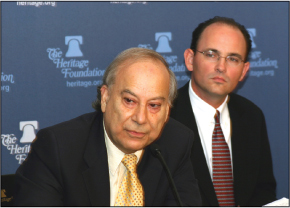Heritage Foundation Hosts
Experts on Islam, Terror
By James McNeely

Akbar Ahmed (left) and Dan Sutherland
|
On September 20th, the Heritage
Foundation, an influential Washington think tank, sponsored
a panel discussion on how the United States and British governments
can build their relationships with Arab and Muslim communities,
with the goal of finding mutual ground and shared success
in the war on terror.
Participants included Daniel Sutherland, the Officer for Civil
Rights and Civil Liberties for the U.S. Department of Homeland
Security; noted Anthropologist and expert on Islam Dr. Akbar
Ahmed, who holds the Ibn Khaldun Chair of Islamic Studies
at the American University; and Dr. James Zogby, of the Arab
American Institute.
Dr. Ahmed argued that a major problem facing the U.S. and
British governments is the efforts of a relatively small number
of radicals to use extremist rhetoric and attacks to draw
media attention. According to Ahmed, these radicals misuse
the teachings of Islam as a vehicle to spread their extremist
ideology. Dr. Ahmed explained that both governments and the
media pay undue attention to these extremist outliers, which
in turn creates a false impression of influence. This overly-narrow
focus on extremists gives momentum to these groups’
recruitment efforts and works to the detriment of mainstream
Arab and Muslim communities, inadvertently offering extremist
groups free publicity and lending them an air of credibility
that they do not deserve.
Dr. Zogby praised Arab-American and Muslim-American communities
for the ways many of them have come to embody the American
Dream. He observed that while Arab and Muslim immigrants have
preserved much of the unique heritage they brought with them,
they have made a mark in American business and culture. Zogby
concluded that America’s ability to absorb immigrants,
and the desire the Arab-American and Muslim-American communities
to be part of America’s plural society, will permit
these communities to weather the shocks that terrorism has
produced.
Sutherland is a senior official in the Department of Homeland
Security and leads the Department’s efforts to develop
partnerships with the Arab-American and Muslim-American communities.
During the panel discussion, Sutherland agreed with Dr. Zogby
by highlighting the importance of building greater understanding
of the Arab and Muslim community. He pointed out the strategic
importance of efforts by the U.S. government to cultivate
“long-term, stable partnerships with broader Arab-American
and Muslim-American communities.” Sutherland also explained
his belief that thoughtful and sincere U.S. engagement with
these communities could help foster support in the global
War on Terror.
Sutherland continued by detailing how such outreach efforts
are an integral part of the government’s security and
law enforcement mission. He explained that the government
is looking to the Arab-American and Muslim-American communities
as a source of recruits with specialized cultural and linguistic
knowledge. He stated that “[w]e need to better understand
Islamic culture, so that we can build stronger ties to our
friends, and better understand those who would misuse this
religion—this culture—to their own ends. We also
need our friends in these communities to know that we accept
and welcome them as Americans, and we need their help.”
Dr. Ahmed in turn pointed out that the United States and British
governments must continuing seeking productive ways to work
against extremist ideologies, while avoiding the sensationalizing
of the threat they pose. One thing that Dr. Ahmed views as
very productive in terms of engaging Muslims in the U.S. and
U.K. with mainstream society is interfaith dialogue. Ahmed
said, “With interfaith dialogue, an alternative platform
for genuine dialogue and respect for the Muslim community
is created.” He added, “Some Muslims that have
participated, for the first time feel that they are part of
this fabric that makes up America.” Diverse religious
groups often function both as outlets for worship and as civic
groups within U.S. society.
Dr. Ahmed discussed partnering with Judea Pearl at interfaith
speaker events. Judea Pearl is the father of Wall Street Journal
reporter Daniel Pearl, who was slain by Al Qaida operatives.
Dr. Ahmed also explained how Pakistani President General Pervez
Musharraf’s speech to the American Jewish Congress was
a positive and very important step.
Sutherland said that the “struggle of ideas is more
likely to be won by people from within these communities than
by any government official.” Sutherland pointed to several
types of individuals as key allies in the Global War on Terror,
including:
• Islamic scholars encouraging open debate on topics
such as the benefits of participating in secular democracy;
• A successful American businessman of Arab or South
Asian origin, telling his family, friends and colleagues about
the potential benefits of free markets governed by the rule
of law;
• A sharp, young Arab-American with language skills
and strong academics, who foregoes a promising private sector
career for the demanding duties of public service in federal
law enforcement; and,
• An imam who writes and speaks about the importance
of critical thinking and the freedoms of speech and conscience.
Sutherland concluded that “we’ll see everyday
heroes like these more and more, as the government continues
to invest and build partnerships in the Arab-American and
Muslim-American communities.”
James McNeely/ DHS
Photo by Andrew Blasko/The Heritage Foundation, Washington,
DC
-------------------------------------------------------------------------------------

